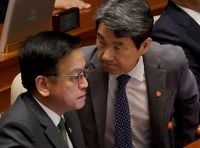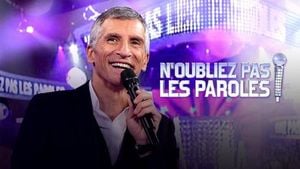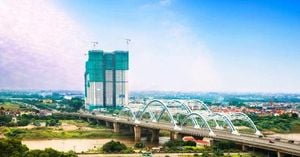On May 1, 2025, the motion to impeach Deputy Prime Minister Choi Sang-mok was rendered moot when it was declared invalid due to a lack of quorum in the National Assembly. This unexpected turn of events occurred shortly after Choi submitted his resignation, effectively eliminating the subject of the impeachment vote.
During a late-night plenary session, Speaker of the National Assembly Woo Won-shik announced that the government had notified him of Choi's resignation as Minister of Economy and Finance. "Therefore, the vote will be suspended because there is no subject to be impeached," he stated, declaring the motion invalid.
The impeachment motion, initiated by the Democratic Party on April 21, 2025, was based on allegations that Choi had infringed upon the National Assembly's authority. Specifically, the motion cited his failure to appoint Ma Eun-hyeok, a candidate for the Constitutional Court, despite a Constitutional Court ruling that supported the appointment. Initially, the Democratic Party had postponed the vote to conduct an impeachment investigation, mindful of public opinion ahead of the upcoming general election.
However, the political landscape shifted dramatically on the same day when the Supreme Court upheld a lower court's decision to acquit Democratic Party leader Lee Jae-myung of violating the Public Official Election Act. This decision came just as Prime Minister Han Deok-soo announced his resignation to pursue a presidential bid, prompting the Democratic Party to swiftly act on Choi's impeachment.
As the Democratic Party attempted to introduce the impeachment motion during the plenary session, which was not originally on the agenda, lawmakers from the People Power Party protested vocally. They surrounded the Speaker's podium, shouting slogans such as "Resign! Woo Won-shik!" and "Criminal! Lee Jae-myung!" in an effort to disrupt the proceedings.
Following the announcement of Choi's resignation, the acting presidency of the Republic of Korea will now pass to Lee Joo-ho, the Deputy Prime Minister and Minister of Education. This transition marks a significant moment in South Korean politics, as the government navigates through a period of instability and impending elections.
Choi Sang-mok's resignation was anticipated by officials within the Ministry of Economy and Finance. According to sources, he had expressed his intention to resign upon learning of the impeachment motion, indicating that he would formally announce his resignation immediately following the vote's resolution.
Choi's impeachment motion had a complicated history, dating back to March 21, 2025, when it was first proposed by the Democratic Party. After being reported to the plenary session on April 2, it was referred to the Legislation and Judiciary Committee for further investigation. The committee's findings ultimately led to the motion being brought to a vote on May 1.
Despite the Democratic Party's efforts to hold Choi accountable, the rapid developments surrounding the Supreme Court's ruling and Prime Minister Han's resignation altered the political dynamics significantly. With Choi's departure, the Democratic Party's strategy to leverage the impeachment motion for political gain has been undermined.
As the new acting president, Lee Joo-ho faces the challenge of stabilizing the government during this tumultuous time. In a meeting with Han Deok-soo, who returned to the government complex in Seoul, Lee was urged to ensure that the government remains stable and operational despite the significant leadership changes.
The implications of these political maneuvers extend beyond the immediate resignations and impeachment motions. They reflect a broader struggle within South Korean politics, where party dynamics, public opinion, and judicial decisions intertwine to shape the governance landscape.
In the wake of these events, analysts are closely watching how the Democratic Party will adjust its strategies ahead of the general elections. The rapid shifts in leadership and the handling of key political issues may influence voter sentiment and party positioning in the months to come.
As the situation unfolds, the focus will remain on how the new acting president and the remaining government officials navigate the challenges ahead, particularly in maintaining public trust and ensuring effective governance during a period marked by political uncertainty.




